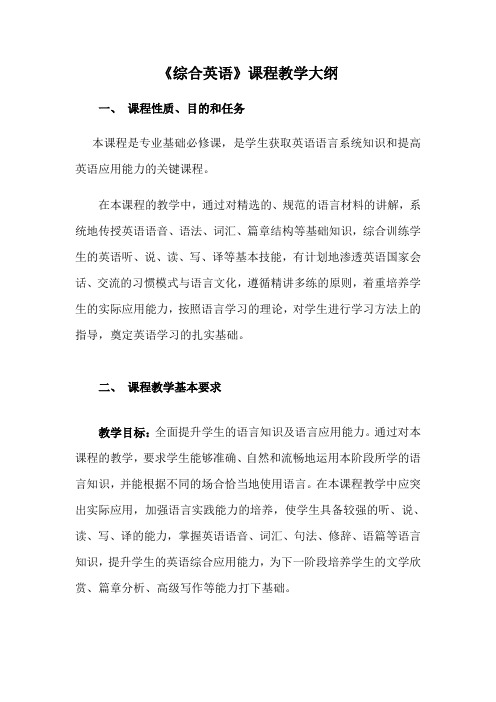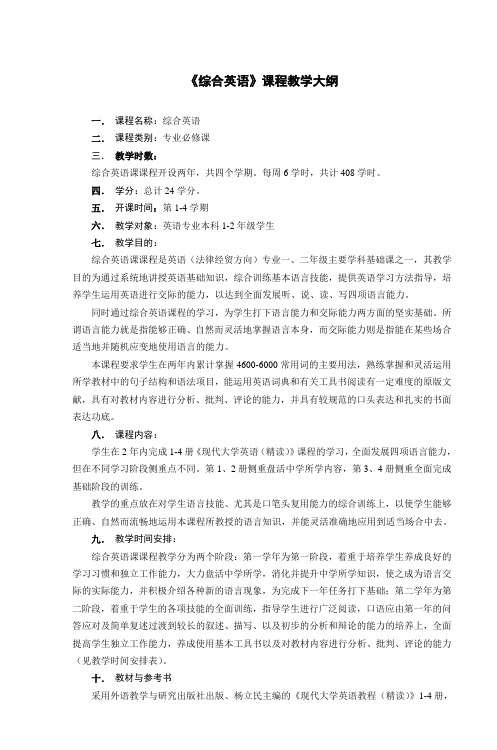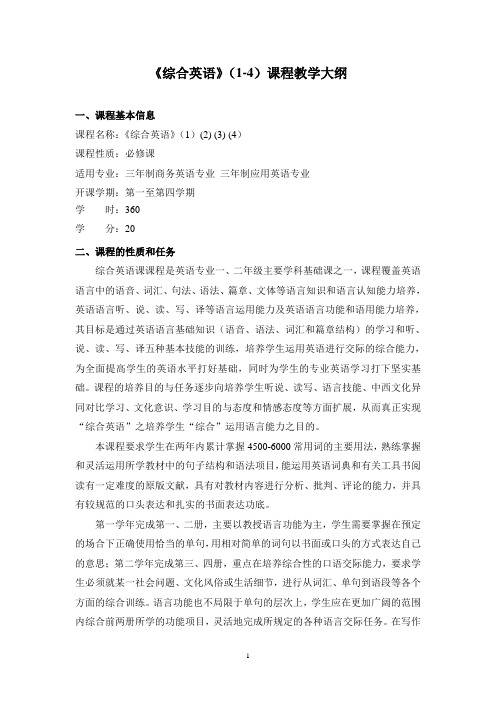《综合英语》教学大纲
- 格式:doc
- 大小:78.50 KB
- 文档页数:6

《综合英语(一)》课程教学大纲一、课程基本情况课程中文名称:综合英语(一)课程英文名称:Integrated Skills of English (I)课程类别:专业必修课课程性质:专业基础课程课程代码:ENGL1104总学分数: 4总学时数:56 其中理论学时数:56 实践(实验)学时数:0适用对象:英语专业本科生先修课程:开课学期:第一学期开课单位:英文学院二、课程教学目的本课程以对话和课文为媒介,在教师的组织下,让学生积极参与,通过对教学内容的讲解,提高学生的综合英语能力。
使学生掌握英语语言体系知识,话语知识,“常用语”知识(knowledge of formulae)和英语文化知识的学习。
本课程在听力理解,口语表达,校对与改错,阅读理解,人文知识、翻译,写作方面使学生能达到本科毕业要求。
本课程的主要目的在于培养和提高学生综合运用英语的能力。
本课程主要通过英语语言基础训练与篇章讲解分析,使学生逐步提高语篇阅读理解能力,了解英语各种文体的表达方式和特点,扩大词汇量和熟悉英语常用句型,具备基本的口头与笔头表达能力,培养学生良好的学习习惯和学习方法,为进入高年级的专业学习打下扎实的基础。
三、先修课的要求无四、课程教学内容、要求及重点、难点第一章(一)主要内容第一节Language Structures (the passive voice and the tense); Dialogue(A New Life on Campus)第二节Reading Comprehension: (Text A) My First Day at School; (Text B) The First Day at University第三节Extended Activities: Interaction Activities; Workbook(二)教学要求1.围绕交际功能“(the passive voice)”进行讨论和练习。

《综合英语》课程教学大纲
一、课程性质、目的和任务
本课程是专业基础必修课,是学生获取英语语言系统知识和提高英语应用能力的关键课程。
在本课程的教学中,通过对精选的、规范的语言材料的讲解,系统地传授英语语音、语法、词汇、篇章结构等基础知识,综合训练学生的英语听、说、读、写、译等基本技能,有计划地渗透英语国家会话、交流的习惯模式与语言文化,遵循精讲多练的原则,着重培养学生的实际应用能力,按照语言学习的理论,对学生进行学习方法上的指导,奠定英语学习的扎实基础。
二、课程教学基本要求
教学目标:全面提升学生的语言知识及语言应用能力。
通过对本课程的教学,要求学生能够准确、自然和流畅地运用本阶段所学的语言知识,并能根据不同的场合恰当地使用语言。
在本课程教学中应突出实际应用,加强语言实践能力的培养,使学生具备较强的听、说、读、写、译的能力,掌握英语语音、词汇、句法、修辞、语篇等语言知识,提升学生的英语综合应用能力,为下一阶段培养学生的文学欣赏、篇章分析、高级写作等能力打下基础。
教学方法:课堂教学以学生为主体、教师为主导,注重培养学生的学习能力、研究能力和创新能力。
在教学中开展形式多样、内容丰富的教学活动,采用启发式、讨论式、发现式和研究式等方法,并运用现代教学手段,积极探索新的教学模式。
作业要求及检查手段:为巩固教学内容,检查学生掌握程度,需布置适量口、笔头作业,采取批阅、抽查与教师指导下的互查相结合的方式进行检查。

《综合英语》课程教学大纲一.课程名称:综合英语二.课程类别:专业必修课三.教学时数:综合英语课课程开设两年,共四个学期。
每周6学时,共计408学时。
四.学分:总计24学分。
五.开课时间:第1-4学期六.教学对象:英语专业本科1-2年级学生七.教学目的:综合英语课课程是英语(法律经贸方向)专业一、二年级主要学科基础课之一,其教学目的为通过系统地讲授英语基础知识,综合训练基本语言技能,提供英语学习方法指导,培养学生运用英语进行交际的能力,以达到全面发展听、说、读、写四项语言能力。
同时通过综合英语课程的学习,为学生打下语言能力和交际能力两方面的坚实基础。
所谓语言能力就是指能够正确、自然而灵活地掌握语言本身,而交际能力则是指能在某些场合适当地并随机应变地使用语言的能力。
本课程要求学生在两年内累计掌握4600-6000常用词的主要用法,熟练掌握和灵活运用所学教材中的句子结构和语法项目,能运用英语词典和有关工具书阅读有一定难度的原版文献,具有对教材内容进行分析、批判、评论的能力,并具有较规范的口头表达和扎实的书面表达功底。
八.课程内容:学生在2年内完成1-4册《现代大学英语(精读)》课程的学习,全面发展四项语言能力,但在不同学习阶段侧重点不同。
第1、2册侧重盘活中学所学内容,第3、4册侧重全面完成基础阶段的训练。
教学的重点放在对学生语言技能、尤其是口笔头复用能力的综合训练上,以使学生能够正确、自然而流畅地运用本课程所教授的语言知识,并能灵活准确地应用到适当场合中去。
九.教学时间安排:综合英语课课程教学分为两个阶段:第一学年为第一阶段,着重于培养学生养成良好的学习习惯和独立工作能力,大力盘活中学所学,消化并提升中学所学知识,使之成为语言交际的实际能力,并积极介绍各种新的语言现象,为完成下一年任务打下基础;第二学年为第二阶段,着重于学生的各项技能的全面训练,指导学生进行广泛阅读,口语应由第一年的问答应对及简单复述过渡到较长的叙述、描写、以及初步的分析和辩论的能力的培养上,全面提高学生独立工作能力,养成使用基本工具书以及对教材内容进行分析、批判、评论的能力(见教学时间安排表)。


《综合英语》(1-4)课程教学大纲一、课程基本信息课程名称:《综合英语》(1)(2) (3) (4)课程性质:必修课适用专业:三年制商务英语专业三年制应用英语专业开课学期:第一至第四学期学时:360学分:20二、课程的性质和任务综合英语课课程是英语专业一、二年级主要学科基础课之一,课程覆盖英语语言中的语音、词汇、句法、语法、篇章、文体等语言知识和语言认知能力培养,英语语言听、说、读、写、译等语言运用能力及英语语言功能和语用能力培养,其目标是通过英语语言基础知识(语音、语法、词汇和篇章结构)的学习和听、说、读、写、译五种基本技能的训练,培养学生运用英语进行交际的综合能力,为全面提高学生的英语水平打好基础,同时为学生的专业英语学习打下坚实基础。
课程的培养目的与任务逐步向培养学生听说、读写、语言技能、中西文化异同对比学习、文化意识、学习目的与态度和情感态度等方面扩展,从而真正实现“综合英语”之培养学生“综合”运用语言能力之目的。
本课程要求学生在两年内累计掌握4500-6000常用词的主要用法,熟练掌握和灵活运用所学教材中的句子结构和语法项目,能运用英语词典和有关工具书阅读有一定难度的原版文献,具有对教材内容进行分析、批判、评论的能力,并具有较规范的口头表达和扎实的书面表达功底。
第一学年完成第一、二册,主要以教授语言功能为主,学生需要掌握在预定的场合下正确使用恰当的单句,用相对简单的词句以书面或口头的方式表达自己的意思;第二学年完成第三、四册,重点在培养综合性的口语交际能力,要求学生必须就某一社会问题、文化风俗或生活细节,进行从词汇、单句到语段等各个方面的综合训练。
语言功能也不局限于单句的层次上,学生应在更加广阔的范围内综合前两册所学的功能项目,灵活地完成所规定的各种语言交际任务。
在写作方面,第三、四册开始培养学生段落写作的能力,学生将学到如描写、说明、议论等基本写作知识。
三、相关课程的衔接应用英语专业的后续课程为《综合英语》(5)、(6)。

综合英语教学大纲第一篇:综合英语教学大纲《基础英语》教学大纲课程名称(Subject):基础英语(Intensive Reading)课程代码:0302A02课程类别:专业基础课学时:102学时学分:6分考核方式:考试使用对象:专科专业一、课程简介精读课是高等院校英语语言文学专业学生必修的一门课程,具有非常重要的地位和作用,它是为满足英语语言文学研究及应用领域对英语专业人才的需要而设置的。
本课程的任务是通过语言基础训练与篇章讲解分析,使学习者不断扩充词汇,提高听说读写的各项技能以及对语法的掌握和运用能力,成为合格的英语专业人才。
二、教学目的及要求通过本课程的学习,要求学习者:1、逐步提高语篇阅读理解能力2、了解英语各种文体的表达方式和特点3、扩大词汇量和熟悉英语常用句型4、具备基本的口头与笔头表达能力5、提高语法的掌握和运用能力基础英语是一门综合英语技能课,其主要目的在于培养学生综合运用英语的能力,综合提高听说读写译各项技能。
三、教学重点及难点教学重点:逐步提高语篇阅读理解能力、了解英语各种文体的表达方式和特点、熟悉英语常用句型、提高语法的掌握和运用能力教学难点:扩大词汇量、具备基本的口头与笔头表达能力四、与其他课程的关系先修课程:《现代大学英语精读》第一、二册五、教学内容BookIVLesson FourA Drink in the Passage本课主要教学内容(Teaching content):1.1The appearance of Apartheid1.2Apartheid South Africa1.3第二篇:《综合英语》课程教学大纲《英语精读》课程教学计划(三年级)第五册第一课Salvation课时:第一周,共4课时教学内容第一节TextPre-reading Questions and Cultural Background of the Text Oral Presentations on the Text Detailed Study of the Text 思考题:1.How was Langston Hughes saved?第二节PracticeText-related practice Questions and answers Discussions and exercises(vocabulary , translation, word study, etc.)Responses from the students Homework第二课 The Game of the name课时:第二周,共4课时教学内容TextPre-reading Questions and Cultural Background of the T ext2、Oral Presentations on the Text3、Detailed Study of the Text思考题:1.The cultural implications of the Chinese names and English names?第二节Practice1.Text-related practice2.Questions and answers3.Discussions and Exercises(vocabulary, translation, word study, etc.)4.Responses from the students5.Homework第三课Thinking of Words课时:第三周,共4课时教学内容第一节TextPre-reading Questions and Cultural Background of the Text Oral presentations on the text Detailed Study of the Text 思考题:1.What is often said about our language capacity? What does it really mean?第二节PracticeText-related practice Questions and answers Discussions and Exercises(vocabulary, translation, word study, etc.)Responses from the students Homework第四课38 Who Saw Murder Didn’t call the Police课时:第四周,共4课时第一节TextPre-reading Questions and Cultural Background of the Text Oral presentations on the text Detailed Study of the Text 思考题:1.Why were those people reluctant to call the people? What did this show?第二节PracticeText-related practice Questions and answers Discussions and Exercises(vocabulary , translation, word study, etc.)Responses from the students Homework第五课What Body Language Can Tell You That Words Cannot课时:第五周,共4课时教学内容第一节TextPre-reading Questions and Cultural Background of the Text Oral Presentations on the Text Detailed Study of the Text 思考题:1.What is the importance of body language? Give examples to prove it.第二节PracticeText-related practice Questions and answers Discussions and Exercises(vocabulary, translation, word study, etc.)Responses from the students Homework第六课 American and the Land课时:第六周,共4课时教学内容TextPre-reading Questions and Cultural Background of the Text Oral Presentations on the Text Detailed Study of the Text 思考题:1.How does John Steinbeck contrast the plunder of the country in the past with that in the present?第二节PracticeText-related practice Questions and answers Discussions and Exercises(vocabulary, translation, word study, etc.)Responses from the students Homework第七课Mental Depression: The Recurring Nightmare课时:第七周,共4课时教学内容第一节TextPre-reading Questions and Cultural Background of the Text Oral Presentations on the Text Detailed Study of the Text 3 思考题:1.Do you agree with the author assertion that few of us get through life without experiencing depression at one time or another?第二节PracticeText-related practice Questions and answers Discussion and Exercises(vocabulary, translation, word study, etc.)Responses from the students Homework第八课 Small Kicks in Superland课时:第八周,共4课时教学内容第一节TextPre-reading Questions and Cultural Background of the Text Oral presentations on the Text Detailed Study of the Text 思考题:1.Do you agree with the author that shopping in the supermarket is an effective antidote to loneliness, a pervasive Western malaise? State your reasons.第二节PracticeText-related practice Questions and answers Discussions and Exercises(vocabulary, translation, word study, etc.)Responses from the students Homework第九课Appetite课时:第九周,共4课时教学内容第一节TextPre-reading Questions and Cultural Background of the Text Oral Presentations on the Text Detailed Study of the Text 思考题:1.Do you agree with the author that one of the keenest pleasures of appetite remains in the wanting, not the satisfaction?第二节PracticeText-related practice Questions and answers Discussions and Exercises(vocabulary, translation, word study, etc.)Responses from the students Homework第十课What is It Like to Be Poor?课时:第十周,共4课时教学内容第一节TextPre-reading Questions and Cultural Background of the Text Oral Presentations on the Text Detailed Study of the Text 思考题:The author claims that the great redeeming feature of poverty is that it annihilates the future.Do you agree or disagree?第二节PracticeText-related practice Questions and answers Discussions and Exercises(vocabulary, translation, word study, etc.)Responses from the students Homework第十一课Befriending课时:第十一周,共4课时教学内容第一节TextPre-reading Questions and Cultural Background of the Text Oral Presentations on the Text Detailed Study of the Text 思考题:1.Why does the author say that in making friends similarity can bread contempt?第二节PracticeText-related practice Questions and answers Discussions and Exercises(vocabulary, translation, word study, etc.)Responsesfrom the students Homework第十二课Dull London课时:第十二周,共4课时教学内容第一节TextPre-reading Questions and Cultural Background of the Text Oral Presentations on the Text Detailed Study of the Text 思考题:th1.In the 18 century Samuel Johnson said that “If a man is tired of London, he is tired of life.” wrence wrote this essay in 1928.Discuss why there should be such a great difference in opinion.第二节PracticeText-related practice Questions and answers Discussions and Exercises(vocabulary, translation, word study, etc.)Responses from the students Homework第十三课At the Indian Camp课时:第十三周,共4课时教学内容第一节TextPre-reading Questions and Cultural Background of the Text Oral Presentations on the Text Detailed Study of the Text 思考题:1.How much do you know about the American Indian culture and civilization?第二节Text-related practice Questions and answers Discussions and Exercises(vocabulary, translation, word study, etc.)Responses from the students Homework第十四课 The Musicians课时:第十四周,共4课时教学内容第一节TextPre-reading Questions and Cultural Background of the Text Oral Presentations on the Text Detailed Study of the Text 思考题:1.Discuss why John Hay calls the small insects musicians.Do you know any other insects that are musical?第二节PracticeText-related practice Questions and answers Discussions and Exercises(vocabulary, translation, word study, etc.)Responses from the students Homework第十五课Tess of the D’Urervilles课时:第十五周,共4课时教学内容第一节TextPre-reading Questions and Cultural Background of the Text Oral Presentations on the Text Detailed Study of the Text 思考题:1.Why does the author use “ A Pure Woman” as the subtitle of the novel?PracticeText-related practice Questions and answers Discussion s and Exercises(vocabulary, translation, word study, etc.)Responses from the students 7 Homework第十六章She’s an Unwilling Tool of Middleclassdom课时:第十六周,共4课时教学内容第一节TextPre-reading Questions and Cultural Background of the Text Oral Presentations on the Text Detailed Study of the Text 思考题:1.What do you think of Thoreau’s statement that technology would make a man a tool of his tools?第二节PracticeText-related practice Questions and answers Discussions and Exercises(vocabulary, translation, word study, etc.)Responses from the students Homework第十七课 What Makes Waves课时:第十七周,共4课时教学内容第一节TextPre-reading Questions and Cultural Background of the Text Oral Presentations on the Text Detailed Study of the Text 思考题:1.How much do you know about Rachel Carson and herSilent Spring?第二节PracticeText-related practice Questions and answers Discussions and Exercises(vocabulary, translation, word study, etc.)Responses from the students Homework第十八课 Two Poems课时:第十八周,共4课时教学内容第一节TextPre-reading Questions and Cultural Background of the Text Oral Presentations on the Text Detailed Study of the Text 思考题:1.How much do you know about English Romanticism and American Modernism?第二节PracticeText-related practice Questions and answers Discussions and Exercises(vocabulary, translation, word study, etc.)Responses from the students Homework第六册第一课 Sexism in School课时:第一周,共4课时教学内容第一节Text1.Pre-reading Questions and Cultural Background of the Text2.Oral Presentations on the Text3.Detailed Study of the Text 思考题:1.Is there sexism on campus? How should we combat it?第二节Practice1.Text-related practice2.Questions and answers3.Discussions and Exercises Responses from the students Homework第二课Philosophers Among the Carrots课时:第二周,共4课时教学内容第一节Text1.Pre-reading Questions and Cultural Background of the Text2.Oral Presentations on the Text3.Detailed Study of the Text思考题:1.How can women balance the relationship between being a housewife and fighting for the cause of Women’s Lib Movement?第二节Practice1.Text-related practice2.Questions and answers3.Discussion and Exercises(vocabulary, translation, word study, etc.)4.Responses from the students5.Homework第三课 The Power of Habit课时:第三周,共4课时教学内容第一节TextPre-reading Questions and Cultural Background of the Text Oral Presentations on the Text Detailed Study of the Text 思考题:1.How to cultivate good habits and get rid of bad habits?第二节PracticeText-related practice Questions and answers Discussions and Exercises(vocabulary, translation, word study, etc.)Responses from the students Homework第四课 The Invisible Japanese Gentlemen课时:第四周,共4课时教学内容第一节TextPre-reading Questions and Cultural Background of the Text Oral Presentations on the Text Detailed Study of the Text 10 思考题:1.Why being observant is important for a writer?第二节PracticeText-related practice Questions and answers Discussions and Exercises(vocabulary, translation, word study, etc.)Responses from the students Homework第五课 Language Teaching and Language Learning课时:第五周,共4课时教学内容第一节TextPre-reading Questions and Cultural Background of the Text Oral Presentations on the Text Detailed Study of the Text 思考题: some of the difficulties you are faced with in learning English.第二节PracticeText-related practice Questions and answers Discussions and Exercises(vocabulary, translation, word study, etc.)Responses from the students Homework第六课 Apology to the Future课时:第六周,共4课时教学内容第一节TextPre-reading Questions and Cultural Background of the Text Oral Presentations on the Text Detailed Study of the Text 思考题:1.Discuss the importance of environmental protection.第二节PracticeText-related practice Questions and answers Discussions and Exercises(vocabulary, translation, word study, etc.)11 Responses from the students Homework第七课 Paper Moons课时:第七周,共4课时教学内容第一节TextPre-reading Questions and Cultural Background of the Text Oral Presentations on the Text Detailed Study of the Text 思考题:1.Is it right to say that the Americans never were much good at making things? Why did Townsend say so?第二节PracticeText-related practice Questions and answers Discussions and Exercises(vocabulary, translation, word study, etc.)Responses from the students Homework第八课 The Case for Greater Clarity in Writing课时:第八周,共4课时教学内容第一节TextPre-reading Questions and Cultural Background of the Text Oral Presentations on the Text Detailed Study of the Text 思考题:Are good writers intelligible writers?第二节PracticeText-related practice Questions and answers Discussions and Exercises(vocabulary, translation, word study, etc.)Responses from the students Homework第九课Money Madness课时:第九周,共4课时教学内容第一节TextPre-reading Questions and Cultural Background of the Text Oral Presentations on the Text Detailed Study of the Text 思考题:1.Do you think money is everything?第二节PracticeText-related practice Questions and answers Discussions and Exercises(vocabulary, translation, word study, etc.)Responses from the students Homework第十课The Teacher as Dragon课时:第十周,共4课时教学内容第一节TextPre-reading Questions and Cultural Background of the Text Oral Presentations on the Text Detailed Study of the Text 思考题:1.What is the cultural implication of dragon in the western countries?第二节PracticeText-related practice Questions and answers Discussions and Exercises(vocabulary, translation, word study, etc.)Responses from the students Homework第十一课The Typhoon课时:第十一周,共4课时教学内容第一节TextPre-reading Questions and Cultural Background of the Text Oral Presentations on the Text Detailed Study of the Text 思考题:1.Discuss the theme of the text.第二节PracticeText-related practice Questions and answers Discussions and Exercises(vocabulary, translation, word study, etc.)Responses from the students Homework第十二课The Plot课时:第十二周,共4课时教学内容TextPre-reading Questions and Cultural Background of the Text oral Presentations on the Text Detailed Study of the Text 思考题:1.E.M.Forster postulated that curious people are often stupid.Do you agree or disagree?第二节PracticeText-related practice Questions and answers Discussions and Exercises(vocabulary, translation, word study, etc.)Responses from the students Homework第十三课The Declaration of Independence课时:第十三周,共4课时教学内容第一节TextPre-reading Questions and Cultural Background of the Text Oral Presentations on the Text Detailed Study of the Text 思考题:1.The significance of the Declaration of Independence第二节PracticeText-related practice Questions and answers Discussions and Exercises(vocabulary, translation, word study, etc.)Responses from the students Homework第十四课Voodoo Cities课时:第十四周,共4课时第一节TextPre-reading Questions and Cultural Background of the Text Oral Presentations on the Text Detailed Study of the Text 思考题:1.What are the major functions of modern cities?第二节PracticeText-related practice Questions and answers Discussions and Exercises(vocabulary, translation, word study, etc.)Responses from the students Homework第十五课Daydreams of What You’d rather Be课时:第十五周,共4课时教学内容第一节TextPre-reading Questions and Cultural Background of the Text Oral Presentations on the Text Detailed Study of the Text 思考题:1.What is American Dream?第二节PracticeText-related practice Questions and answers Discussions and Exercises(vocabulary, translation, word study, etc.)Responses from the students Homework第十六课Supplementary Materials课时:第十六周,共4课时教学内容第一节TextPre-reading Questions and Cultural Background of the Text Oral Presentations on the Text 15 Detailed Study of the Text 思考题:1.Discuss the theme of the text.第二节PracticeText-related practice Questions and answers Discussions and Exercises(vocabulary y, translation, word study, etc.)Responses from the students Homework第十七课 Review课时:第十七-----第十八周,教学内容:复习参考书目: 1)《高级英语》(修订本),第一册,张汉熙主编,王立礼编,外语教学与研究出版社,第一版,2001.7 第 11 次印刷。
综合英语1-4教学大纲综合英语(1)二、课程内容(一)课程教学目标《综合英语》是一门综合技能课, 其主要目的在于培养和提高学生综合运用英语的能力。
本课程主要通过语言基础训练与篇章讲解分析, 使学生逐步提高语篇阅读理解能力, 了解英语各种文体的表达方式和特点, 扩大词汇量和熟悉英语常用句型, 具备基本的口头和笔头表达能力。
教师应鼓励学生积极参与课堂的各种语言交际活动以获得基本的交际技能, 并达到新《大纲》所规定的听、说、读、写、译等技能的要求。
(二)基本教学内容在第一学期完成上海外语教学出版社主编的综合英语教程第一册。
共计14课。
Unit 1 Never Say GoodbyeUnit 2 The Fun They HadUnit 3 Whatever Happened to MannersUnit 4 Dealing with AIDSUnit 5 How to Be True to YourselfUnit 6 Is an Only Child a Lonely ChildUnit 7 When lightning StruckUnit 8 My Forever ValentineUnit 9 HollywoodUnit 10 A Debt to DickensUnit 11 SalvationUnit 12 Gender Bias in LanguageUnit 13 The Light of DepressionUnit 14 Five Traits of the Educated Man本课程主要通过语言基础训练与篇章讲解分析, 使学生逐步提高语篇阅读理解能力, 了解英语各种文体的表达方式和特点, 扩大词汇量和熟悉英语常用句型, 具备基本的口头和笔头表达能力。
教师应鼓励学生积极参与课堂的各种语言交际活动以获得基本的交际技能, 并达到新《大纲》所规定的听、说、读、写、译等技能的要求。
通过该课程, 学生可以学到英语语言知识, 并能培养学生运用语言知识的综合能力。
《综合英语》教学大纲一、总纲《综合英语》是高等院校英语专业的一门专业基础必修课。
它主要从听、说、读、写、译等方面,通过循序渐进的方式,使学生逐步掌握系统的语言基础知识,包括语言体系知识、话语知识和“常用语”知识,为他们提高语言交际能力打下坚实的基础。
同时还培养学生以下几个方面的能力:1、学习者的学习策略能力;2、语言尝试能力;3、语言思维能力;4、语言教师的职业能力。
此外,还兼顾文化知识的学习。
教学目标:注重培养学生的语言基本功,使听、说、读、写、译的能力打下扎实的基础;传授英语基础知识,对学生进行全面的、严格的基本技能训练,培养学生实际运用语言的能力、良好的学风和正确的学习方法,为进入高年级打下扎实的专业基础。
学时分配:《综合英语》(Integrated Skills of English)课程须完成268学时。
课程安排在第1、2、3、4学期,每周4学时。
使用教材:《综合英语教程》1,2册邹为诚等编著高等教育出版社1998年版。
主要参考书目:(1)《新编英语教程》-1,李观仪等编著;上海外语教育出版社;1998版。
(2)《新编英语教程》-2, A New English Course 李观仪主编;上海外语教育出版社;1998年版(3)《朗文英语语法》Longman English Grammar L.G.亚历山大主编外语教学与研究出版社(4)《语言技能训练指导TEM4》邹申主编上海外语教育出版社(5)《新编英语教程》-3,李观仪等编著,上海外语教育出版社,1999年8月第二版(6)《新编英语教程》-4,李观仪等编著,上海外语教育出版社1998年版考核方式:闭卷考试。
二、主要内容及教学大纲要求绪论(1学时)主要内容:课程内容注重各项语言技能的全面发展,突出语言交际能力的培养。
使学生在听、说、读、写、译等各项技能方面得到全面发展。
加强学生思维能力和创新能力的培养。
要求在教学中要有意识地训练学生分析与综合、抽象与概括、多角度分析问题等多种思维能力以及发现问题、解决难题等创新能力。
《综合英语》课程教学大纲课程类型(理论、实训、一体化):理论课程适用专业:商务英语课程适用层次:中技+大专一、说明1、课程作用和目标1)课程作用:本课程是英语专业的专业基础课。
它与英语专业基础阶段旨在开展学生听、说、读、写等语言单项技能的课程相辅相成,使学生在得到语言技能的分项训练的同时,得到全面、严格的听、说、读、写、译等语言基本技能的整合性训练,到达对英语基础语法和基本词汇的熟练掌握和正确运用,使各种语言技能协调开展,从而获得语言实际运用的能力。
它还致力于使学生通过阅读和语言材料的课堂讲解分析,翻开独立思考的空间,使他们的批判思维能力得到开展,人文知识得到增长,人文素养得到提高,为进入高年级的专业知识课程和相关专业知识课程的学习打下扎实的专业基础。
2)课程学习目标:本课程的教学目标是通过英语语言基础知识(语音、语法、词汇和篇章结构)的学习和听、说、读、写、译等基本技能的训练,培养学生运用英语进行交际的综合能力,为全面提高学生的英语水平打好基础,使学生到达高等教育英语专业(专科)的合格标准。
2、教学中应注意的问题1)正确处理语言知识和语言能力的关系教学中要注意,语言知识的讲授应该结合实践,而不应单纯追求知识本身的系统性。
知识工程的选择和安排要服从语言实践活动的需要,而不应引导学生死记语法规那么。
语言知识掌握得如何,要看学员在语言实践中运用这些知识的能力。
2)正确处理听、说、读、写、译等各项技能的关系本课程要对学生进行严格的听、说、读、写、译等基本技能训练。
教学过程中应根据循序渐进的原那么,不同阶段须有不同的侧重。
在进行听说训练的同时,应该强化读写训练。
课文学习应注重段落篇章的整体理解。
强调在段落、篇章中学习词汇、词组和习惯用语,以提高连贯表达能力。
结合课文,逐步介绍写作、翻译、修辞及文学欣赏方面的基础知识。
3)重视教材在教学过程中的作用教材是实现大纲的重要保证。
为了打好语言基础,培养语言运用能力,提高文化素养,教材应为学生自学或课堂辅导提供最正确的语言样本和系统的、有针对性的语言材料。
《综合英语》教学大纲
课程名称:综合英语
英文译名:An Integrated Course of English
课程类别:专业基础课
课程学分:总计24学分,每学期计6学分
课程学时:总计384学时,分为4学期完成,每学期课堂讲授和课堂实训64学时,自主治学32学时)
教学对象:英语专业一、二年级本科生
一、课程描述:
本课程是为英语专业一、二年级本科生开设的专业基础课程,贯穿英语专业本科教育基础阶段,分四学期完成。
课程的基本目标是全面训练学生的听、说、读、写、译各项基本技能。
教学以应用语言学的“互动假设”为理论基础。
一方面注重为学生提供大量的可理解性输入,教师通过对规范的语言材料进行讲解,传授系统的英语语音、语调、语法、词汇、篇章结构、文化社会等知识,同时引导学生课后精选和阅读与自身语言水平和知识背景相适宜的英语材料,收听和收看经典音像资料;另一方面注重输出的促学作用,要求学生的在课堂和课后以协作的方式需完成大量的口、笔头交际练习,引导他们关注自身英语知识的缺陷,反思语言学习过程。
课程的中层目标在于培养学生的英语交际意愿和跨文化意识。
英语交际意愿是决定学生在存在机会时是否发起和参与交际活动的直接因素;跨文化意识决定学生英语交际活动的效率甚至成败。
本课程教学实施过程中,教师通过鼓励和协助的方式使学生逐步认识到采用英语交际的社会和个体价值,克服学生的消极面子观念,强化交际信心,满足情感需求,直至形成较强的交际意愿。
同时,通过理论传授、案例分析、场景模拟等方式引导学生正视文化差异,形成跨文化意识,明确语言工作者作为文化传播者的身份认同。
课程的高级目标是通过语言文化学习提高学生的批判性思维能力。
教学过程中引导学生对语言和文化事实进行对比、归纳、分析和抽象,注重发掘不同语言文化现象之间的联系,学习建立和检验有关语言文化问题的假设,养成专业意识,为高年级专业基础课程“高级英语”以及专业课程“英语语言学”、“应用语言学”、“英国文学”、“美国文学”、“翻译”等的学习打好基础。
二、分级任务:
本课程教学在坚持整体语言教学观,全方位训练基本语言技能,提升专业素养的同时,根据语言学习的规律,在课程教学的各个阶段有所侧重。
第一学期:
重点在于培养学生良好的语音面貌。
过程为“师评—定点—纠音—互评—巩固”,即在内容教学时有目的地选取若干词、短语、句子和篇章对学生发音、重音处理和语调进行评估,确定每个学生的问题,采取教师指导和学生模仿的方式进行纠正,安排学生课后有针对性地加强语音薄弱环节的训练,要求学生对课后训练的内容录音并进行互评,进一步发现问题,巩固训练成果。
此外课堂上和课后均重视听力/听写训练,在提高对英语语音规律敏感性的同时提高学生的听力。
学生在语音训练的同时附带性地习得词汇和句型,强化英语语感,为下一阶段对词汇和语法的元认知训练做准备。
第二学期:
重点在于强化学生的词汇习得能力。
在课程教学中教师引导学生有意识地对英语词汇的词源、形态构成以及文化信息进行梳理,增加对英语词汇的元语言分析,变被动接受为主动习得,强化学习词汇的能力,在较短时间内实现词汇量的飞跃。
要求学生课后分模块整理英语词汇,并对重点词语进行精细化加工,要求掌握其发音、形态和用法,了解词源和词语内部结构,掌握其曲折和派生形式。
本阶段同时注意引导学生发现语音和词语结构之间的联系,继续巩固上一阶段语音训练成果。
第三学期:
重点在于提高学生的语句加工能力。
教学以教学材料中的关键句型为切入点,启发学生思考英语的语句构成、信息结构和逻辑关系。
教师首先引导学生注意课文中的相关句型,然后大量输入同类句子供学生发现规律,同时提供相对应的汉语语句使学生认识跨语言差异,然后指导学生举一反三、造句操练。
造句联系坚持由易及难,从提供材料造句到自由造句。
最后才系统讲授关于该句型的语法知识和重点难点,实现对该方面知识的元语言认知。
本阶段还重视句子结构和语调之间的联系,培养学生依据句法和意群处理重音和语调的能力。
第四学期:
重点在于深化学生的篇章处理能力。
教学注重对材料的宏观把握,加强对时代背景、文体特征、写作风格、语言特点的分析。
教学过程中教师指导学生依据作品内容的时代信息,发掘有关主题的历史或社会情境,以此加强学生对于英语
国家历史、文化和社会的认知;启发学生对不同单元的作品以体裁进行分类,总结每一类体裁的文体特征,并仿写;选取同一作者的作品作为课后阅读材料,分析其个人风格和语言特点;比较英汉语同题作品,注意在信息更迭和逻辑结构方面的跨语言差异,以达到提升英语篇章的组织能力的目的。
注意:本课程强调听、说、读、写技能训练不可偏废,故在上述四个阶段,四项基本技能同时进行。
此外,交际意愿的培养、跨文化意识的提升以及批判思维的训练贯穿整个课程教学始终。
三、教学组织和学时分配:
四、教学内容:
本大纲仅列出各单元总体内容,具体教学内容安排见“教学日历”。
课程教材:
何兆熊主编,《综合教程》(第二版)1-4册,上海外语教育出版社,2011.
辅助教材:
文卫平主编,《世纪英语阅读教程》,中南大学出版社,2001.
唐德根主编,《21世纪英语交际口才》,中南大学出版社,2002.
五、课程各教学环节要求:
本课程教学应以学生为主体、教师为主导,注重培养学生的学习能力、研究能力和写作能力。
在教学中要多开展以任务为中心的、形式多样的教学活动。
在加强基础训练的同时,采用启发式、发展式、研究式的教学方法,充分调动学生学习的积极性,激发学生的学习动机,最大限度地让学生参与学习的全过程。
课后练习教师要把握好学生在语音、阅读、翻译和写作等训练项目上体现出阶梯性提高的训练方式和方法,突出训练巩固与提高的目的。
第一、二学期重点突出知识点的巩固和语言的实际运用,作业主要为语音练习、听力听写训练、词汇练习。
第三学期以语法项目练习为主。
第四学期继续讲授语言基础知识和训练应用能力外,重点培养学生语篇的归纳性和分析解决问题的能力。
教师应引导学生主动积极地利用现有图书资料和网上信息,获得知识,并使学生在运用知识的过程中培养各种能力。
同时,要注意教学方法的多样性,要根据不同的教学对象、教学内容、教学目的和要求,选择相应的教学方法,并鼓励教师积极探索新的教学方法。
课堂指导要与课堂实训以及课后学生的自主治学相结合。
自主治学是课堂教学的延伸与扩展,是培养和发展学生能力的重要途径,应在教师的指导下有目的、有计划、有组织地进行。
自主治学活动以课堂教学的内容为基础,激发学生的学习兴趣,以及培养学生的学习能力、语言综合运用能力、组织能力、交际能力、思维能力和创新能力。
活动应面向全体学生,注意发展个性,提倡人人参与,培养合作精神。
其形式可包括:课外阅读、演讲、辩论、读书报告会、戏剧表演、阅读或编辑报纸杂志、专题访谈、教学见习、社会实践等。
除参加校内课外学习和实践活动外,还应鼓励学生积极参加与专业相关的各种社会实践活动。
六、测试与评估
测试与评估的目的在于跟踪学生的综合语言能力发展水平,检测本课程内容学习的进展,以及学生的自主治学情境,同时考查教师对教学大纲的执行情况,从而起到反拨教学过程的作用。
鉴于以上目的,本课程测试最终成绩构成为:
最终成绩= 平时成绩(30%)+ 期末测评成绩(70%)
平时成绩评定标准
平时成绩由教师和同学共同依据学生在课堂实训和自主治学环节的任务完成情况以及完成课后作业的情况,分为四个等级。
优秀(90-100分):积极参与课堂活动,按时保质保量地完成课后自主治学任务和作业,在协作式学习团队中担任组织者和领导者角色,表现突出。
良好(80-89分):主动参与课堂活动,按时保量完成课后自主治学任务和作业,但质量略有欠缺。
在协作式学习团队中担任骨干参与者角色,表现较好。
一般(60-79分):参与课堂活动但缺乏主动性,不能按时保量课后自主治学任务和作业的情况少于1/3。
在协作式学习团队中担任被动参与者角色。
不及格(60分以下):极少参与课堂活动,超过2/3的情况下不能按时保量课后自主治学任务和作业。
在协作式学习团队中担任被动参与者角色或完全不参与。
期末考试构成:
期末考试采取水平测试与成就测试相结合的方式,既考察学生的综合语言水平,又检测课堂教学内容的掌握情况,具体构成见下表。